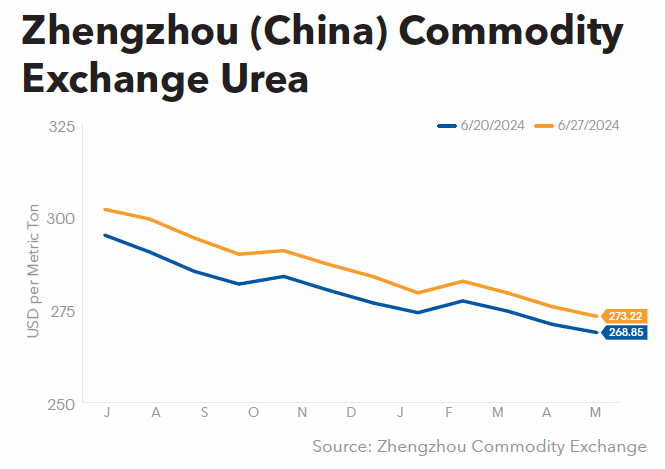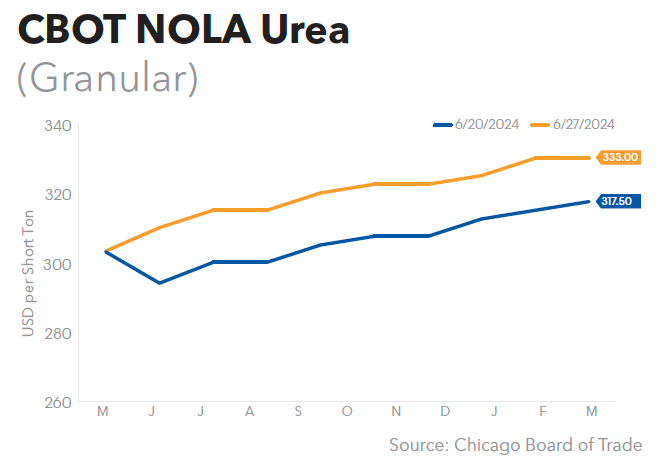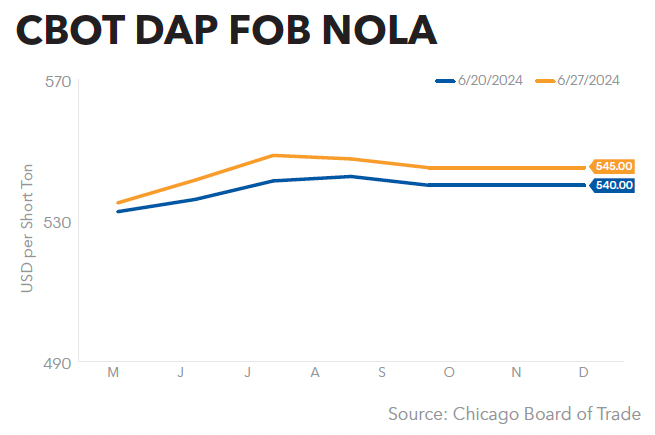Fertilizer Futures



The Egyptian government renewed its cutback of natural gas to fertilizer producers in late June, forcing most, if not all urea plants, to shut down. The government shifted its limited natural gas resources away from industrial use to accommodate power needs as extreme heat is causing increased power demand for residential air conditioning.
Sources told Green Markets that all the major urea producers had closed their plants by the middle of this week. Local media reports indicated some plants had shifted from natural gas to hydrogen for some of their operations. Some NPK producers are also reportedly tapping into their solar power reserves to maintain limited blending operations. Sources said they had no indications when the gas supplies would be restored.
The government issued a similar notice to urea producers at the end of May (GM June 7, p. 1). At that time, plants shut down, leaving a large gap in urea availability. Within a week of the May announcement, however, some producers reported a gradual return to normal gas levels.
Prices from granular sales moved up from $310/mt in late May to $340/mt FOB in mid-June because of the cutbacks. No new sales have been reported since mid-June. Producers were hoping to rebuild inventories in case demand stepped up. With the renewal of natural gas restrictions and the calling of a urea tender by India, speculators have moved the price to $375/mt FOB for July shipments, if any tons are available.
The Mosaic Co. reported in mid-June that the three-year, $35 million MicroEssentials capacity expansion at its Riverview MAP facility in Florida is now complete, boosting production capacity to 800,000 mt/y.
“Prior to completion of this project, total MicroEssentials production across our North America phosphate operations was 4.3 million tonnes per year,” said Kelly Strong, Vice President Operations, Phosphate. “With customer demand for MicroEssentials projected to increase to more than five million tonnes by 2026, we needed this additional production capacity to ensure we’re able to meet that demand.”
MicroEssentials is one of four specialty fertilizers produced by Mosaic. The product line consists of four formulations: S9, S10, S15, and SZ, with all formulations containing nitrogen, phosphorus, and sulfur, and the SZ formulation adding zinc. When the MicroEssentials capacity at Riverview is fully ramped up, Mosaic said more than half of its US phosphate production will be higher-margin, performance fertilizers.
“Growing our production capacity for MicroEssentials and other specialty products is important, not just to keep pace with growing demand but because it gives us options to stabilize and improve our results,” Kelly said. “We’re in a cyclical business and global demand is influenced by external factors we can’t control, so having a diverse product portfolio and the operational flexibility we need to be able to adjust production helps us steer our own ship.”
MicroEssentials was developed and first produced at Mosaic’s Bartow facility in 2001. Increased customer demand led the company to expand production of various formulations at its Riverview facility in 2005, the Faustina facility in Louisiana in 2012, and the New Wales facility in Florida in 2015.
Interoceanic Corp., White Plains, N.Y., announced on June 27 that its affiliate company Rapid Plant Nutrients LLC has acquired the assets, brands, and trademarks of Bonus Crop Fertilizer (BCF), headquartered in Greenville, Texas.
Established in 1982, BCF is a producer of fertilizers for the consumer retail industry and the professional lawn and landscape, golf, sports field, and nursery/greenhouse markets. The company operates mixing, screening, formulating, and bagging operations in north Texas that serve customers in the Southeast and Southwest US.
“Our goal is to continue to bring our family values and our supply chain efficiencies to the professional and consumer fertilizer industry, said IOC President Elio Mazzella. “Choosing Bonus Crop as a strategic partner was the next big step to strengthening our geographical footprint. We can now continue to increase our service capabilities to both our professional distributors and our consumer retail partners.”
The acquisition follows IOC’s purchase in 2022 of Spring Valley USA (GM Nov. 23, 2022), a producer of fertilizers for the turf and ornamental market headquartered in Jackson, Wisc. In addition to BCF, Spring Valley, and Rapid Plant Nutrients, the IOC family of companies now includes Chimico Rail, Chimico Logistics, EM2 Enterprises LLC, and PCI Nitrogen, one of the largest global producers of bulk synthetic grade granular ammonium sulfate at Pasadena, Texas.
“Finding a partner who will continue to carry on the legacy of our business that we spent the last 40-plus years nurturing and building was important to me, my family, and to the associates at Bonus Crop,” said Steve Barton, President and owner of BCF. “Having watched the success IOC has brought to the market with the Spring Valley acquisition just 18 months ago, and its supply chain efficiencies, aligning with two powerful brands in the market just made perfect sense for me and my family.”
“BCF will be a solid addition to IOC’s family of companies,” Mazzella added. “Our ability to bring market knowledge to our BCF and Spring Valley acquisitions, along with our capability to move raw materials efficiently and cost effectively throughout the country, will continue to provide exceptional value to our end-user partners across all channels. BCF’s geographical footprint continues to complement our model of supply chain efficiencies.”
Members of Farmers Cooperative Elevator Company (FCEC) in Garden Plain, Kan., have approved a merger with Kanza Cooperative Association, Iuka, Kan. The merger will become effective on Sept. 1, 2024, with the combined organization headquartered in Iuka and operating under the Kanza Cooperative Association name.
FCEC members approved the merger in late May with a vote of 180-85, meeting the two-thirds majority required by Kansas law. The vote was the second scheduled for the merger, with an earlier vote in April failing to meet the threshold with a lower voter turnout of 113-57.
“We had an excellent turnout from the membership and are very pleased that the majority approved the merger,” said Dixie Brewster, Board President of FCEC. “This vote has set our cooperative on the best track to maintain high quality service and products to our members, stay the employer of choice in our communities, and protect our members’ equity for generations to come.”
The merger was unanimously approved by both boards earlier this year, with a definitive merger agreement signed in March and a letter of intent in January. The boards noted that both organizations are financially strong and share a similar geography and many of the same members, and said a combined business would be more efficient, provide stronger customer service, and create opportunities for synergies.
The combined cooperative will operate from 31 Kansas locations and employ a full-time staff of 204. Based on the latest full fiscal year, the combined agronomy, grain, energy, and feed businesses are projected to generate $407 million in annual sales with $285 million in total assets.
“We are excited for the synergy that is possible as we bring these two strong cooperatives together,” said Alvin Neville, Board Chair of Kanza. “We have so much in common from geography to services to strong financial positions. Together we will create a better cooperative for our members, employees, and the community we serve.”
Alan Woodard, current CEO of Kanza, will be the General Manager and CEO of the combined organization. Rusty Morehead, current CEO of FCEC, will remain on the management team as a key employee.
The new board will consist of nine current Kanza board members and two current FCEC board members, plus one additional associate board member from FCEC. Going forward, the 11-member board will consist of six members from the co-op’s west region, which is primarily Kanza’s existing territory, and six from the east, where FCEC’s operations are focused.
FCEC currently operates agronomy, feed, grain, and petroleum divisions from Kansas locations at Bentley, Halstead, Mount Hope, and Patterson. Kanza traces its roots to 1915 and began operating under the Kanza name in 2001 after several mergers and acquisitions. Another merger with Andale Farmers Cooperative in 2016 expanded the co-op again (GM Jan. 15, 2016), and Kanza currently operates agronomy, grain, feed, energy, and sunflower trading businesses from 27 locations.
Australia’s Strike Energy Ltd., Thebarton, South Australia, has decided to shelve its plan to build a $3 billion fertilizer plant known as Project Haber, and will instead focus on producing electricity.
Strike in 2021 announced plans to build Project Haber, an ammonia and urea complex for Western Australia’s Narngulu Industrial Estate, adjacent to Geraldton Port (GM Jan. 15, 2021). The complex envisioned a 1.4 million mt/y urea plant and an 800,000 mt/y ammonia plant using natural gas from Strike’s Greater Erregulla development in the Perth Basin via a 120-kilometer pipeline.
Strike brought its Walyering natural gas project in the northern Perth Basin online in September 2023. But Managing Director Stuart Nicholls said some of the company’s appraisals of existing gas resources at South Erregulla were unsuccessful, resulting in a “dramatically” lower estimate of the amount of gas available.
“Our ambitions to build a 1.4 million-tonne urea facility are ostensibly delayed for quite some time and will be subject only to being able to find additional gas resources and bring those to market,” he told local media.
Strike purchased farmland west of Three Springs for the urea plant and will now build a gas-powered peaking power plant at the location. Strike has submitted an application to the Australian Electricity Market Operator (AEMO) for the award of capacity credits and network access. If granted, Nicholls said the 85-megawatt peaking power station would be operational by October 2026.
In 2022 Strike was granted major project status by the federal government for Project Haber to streamline approvals and project support. The company in 2021 said it was in discussions with “several parties” for fertilizer offtake and equity agreements in the project, and said it planned to secure offtake agreements for up to 80% of the project before entering into front-end engineering and design (FEED) for the project.
At the time of the 2021 announcement, Strike estimated gross fertilizer revenues from Project Haber at A$540-A$700 million per year, or approximately $418-$542 million based on then-current exchange rates and urea prices in both wholesale and direct markets. Strike said the facility would be primarily focused on meeting the needs of Australian farmers, with surplus product to be made available to international markets.
The Andersons Inc., Maumee, Ohio, announced on June 25 that Joe McNeely, President of the company’s Nutrient & Industrial business, will retire at the end of 2024. Andy Spahr, Vice President of the Wholesale Business, will assume the role of Senior Vice President, overseeing the Nutrient & Industrial segment on July 1, 2024.
McNeely, who began his career with The Andersons in 2017 as president of the Rail Group and later assumed responsibility for the former Plant Nutrient Group, forming the Nutrient & Industrial segment, will provide transition assistance and oversee the Nutrient & Industrial growth pipeline until his retirement.
“We are extremely grateful for all the work Joe has done to grow our Nutrient & Industrial business,” said Bill Krueger, The Andersons Chief Operating Officer. “His leadership through the divestiture of the rail business and strategic acquisitions in the fertilizer space have been instrumental in helping our Nutrient & Industrial business achieve record performance.”
Spahr joined The Andersons in 2011 and has held a variety of progressive roles in the former Grain Group before moving to the fertilizer business in 2016. As Vice President of the Wholesale Fertilizer Business, he led a team responsible for procuring and distributing more than 1.5 million st/y of crop nutrients, predominately in the Eastern Cornbelt.
“Andy’s experience in the industry and across our businesses enables him to understand the needs of our customers and how to best leverage the market dynamics that drive this diverse business,” Krueger said. “I am excited for him to expand his role and to continue serving the company in this leadership capacity.”
Junior miner Sage Potash, Vancouver, B.C., on June 26 announced the appointments of Clark Sazwan on the Board of Directors, Amir Rahimtula as Global Markets and Finance Partner, and Shilo Sazwan as a new Strategic Operations Partner.
Sage said the appointments will accelerate its efforts in domestic potash production at the Sage Plain Property in Utah and follows Sage’s closing in May of non-brokered private placements grossing $1,822,500.
Clark Sazwan is the Owner and Director of Tiger Tank Lines, former Owner and current Director of Tiger Calcium, and the Director/Owner of Keg River Chemicals. Rahimtula is President of Transnational Enterprises, a Canadian trading company, and is the grandson of Amir Ali Rahimtula Sr., the first Chairman of the Fertilizer Association of India.
Shilo Sazwan served as the Chief Operating Officer at Tiger Calcium, where he oversaw 500 employees and led the development of multiple calcium and fertilizer plants with custom in-house technologies and a logistic division with rail and trucking fleets. Sage said he has more than three decades of fertilizer industry experience.
The US Department of Agriculture’s (USDA) National Agricultural Statistics Service (NASS) has named Joseph L. Parsons as its new Administrator as of June 16, following the retirement in March of previous Administrator Hubert Hamer.
Parsons has been with NASS for more than 37 years, previously serving as Acting Administrator and before that as Associate Administrator. He also served as chair of USDA’s Agricultural Statistics Board and director of NASS’s Methodology Division.
Joseph J. Prusacki, a NASS employee since 1984 and former director of NASS’s National Operations Division in St. Louis, Mo., will remain as NASS’s acting Associate Administrator until the position is filled later this year.